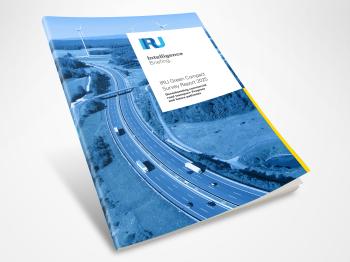The transition is underway. But regulatory uncertainty and restrictions are undermining it. What needs to change? We asked one of the leading global providers of clean fuel solutions.
Globally, operators express deep concern about decarbonisation, including due to a complex regulatory landscape.
We spoke with Alana Tetdoeva, EU Government Affairs Representative at IRU member Hexagon Agility, about the regulatory hurdles.
What is the biggest decarbonisation challenge?
A key challenge is the lack of unified EU policies on greenhouse gas emission standards and renewable fuels. While legislation exists, the policies remain fragmented.
For example, there are multiple upcoming revisions and differences still among institutions as to how the regulations should be amended. Without concrete, consistent legislation across the EU, it's incredibly difficult for companies to plan long-term fleet investments. With no stable framework for assessing long-term costs, this uncertainty also affects capital expenditures and energy prices, including for key alternative fuels such as biogas.
A clear, EU-wide policy based on a lifecycle emissions approach, considering emissions from well-to-wheel, not just at the tailpipe, is essential to drive confident, cost-effective decarbonisation decisions.
How can we accelerate decarbonisation?
There are a few important changes that need to be made to EU regulation to ensure we can accelerate decarbonisation.
The EU should adopt a well-to-wheel approach to recognise renewable fuels for their real decarbonisation benefits. Properly defining carbon-neutral fuels and crediting avoided emissions would also level the playing field.
Instead of focusing only on penalties for fossil fuels, there should be strong incentives to support the use of renewable alternatives. Any cleaner viable alternative to diesel, like biomethane, should be rolled out immediately to jump-start the transition and advance the EU’s decarbonisation goals.

How are you helping the industry to decarbonise?
Hexagon Agility develops and manufactures advanced fuel systems for a wide range of alternative fuels. We know that we need all the alternative fuels at our disposal to displace diesel.
We enable fleets around the world to decarbonise their commercial vehicles, and to do so with the alternative fuel that best suits their operations.
Biomethane stands out as a clean renewable fuel particularly suitable for long-haul trucking, which is the road application so far proving frustratingly hard to decarbonise with any other clean fuel.
Our lightweight systems enable trucks running on biomethane to achieve a diesel-like driving range. We have already equipped IVECO trucks in the UK that run 1,100km per fill on biomethane, with fuel vessels installed behind the truck cabin.
Biomethane is a demonstrated solution for hard-to-abate sectors, like long-haul transport, and is widely used in North America. Uptake in the EU has been slower due to truck dimension restrictions. Provided regulations allow it, it is an increasingly elegant solution to this decarbonisation challenge.
How do you measure and track your decarbonisation progress?
As part of Hexagon Group, we track and report scope 1-3 emissions on an annual basis. Hexagon is committed to net-zero emissions by 2050, and our reduction targets are validated by the Science-Based Target initiative. But we also focus on our own impact and track CO2 emissions that our systems help avoid every year by replacing diesel engines.
In 2024, our solutions helped prevent over 1.8 million metric tonnes of CO2-equivalent emissions – proof that scalable, real-world impact is already happening.
Discover decarbonisation best practices and expertise in IRU's new Green Compact Survey Report.
About Hexagon Agility
Hexagon Agility, a business of Hexagon Composites, is a leading global provider of alternative fuel solutions for commercial vehicles and gas transport solutions. With over 30 years of industry experience, Hexagon Agility’s team of 900+ alternative fuel experts offer best-in-class product development, manufacturing, service, and support to OEMs, dealers, and fleet operators.
